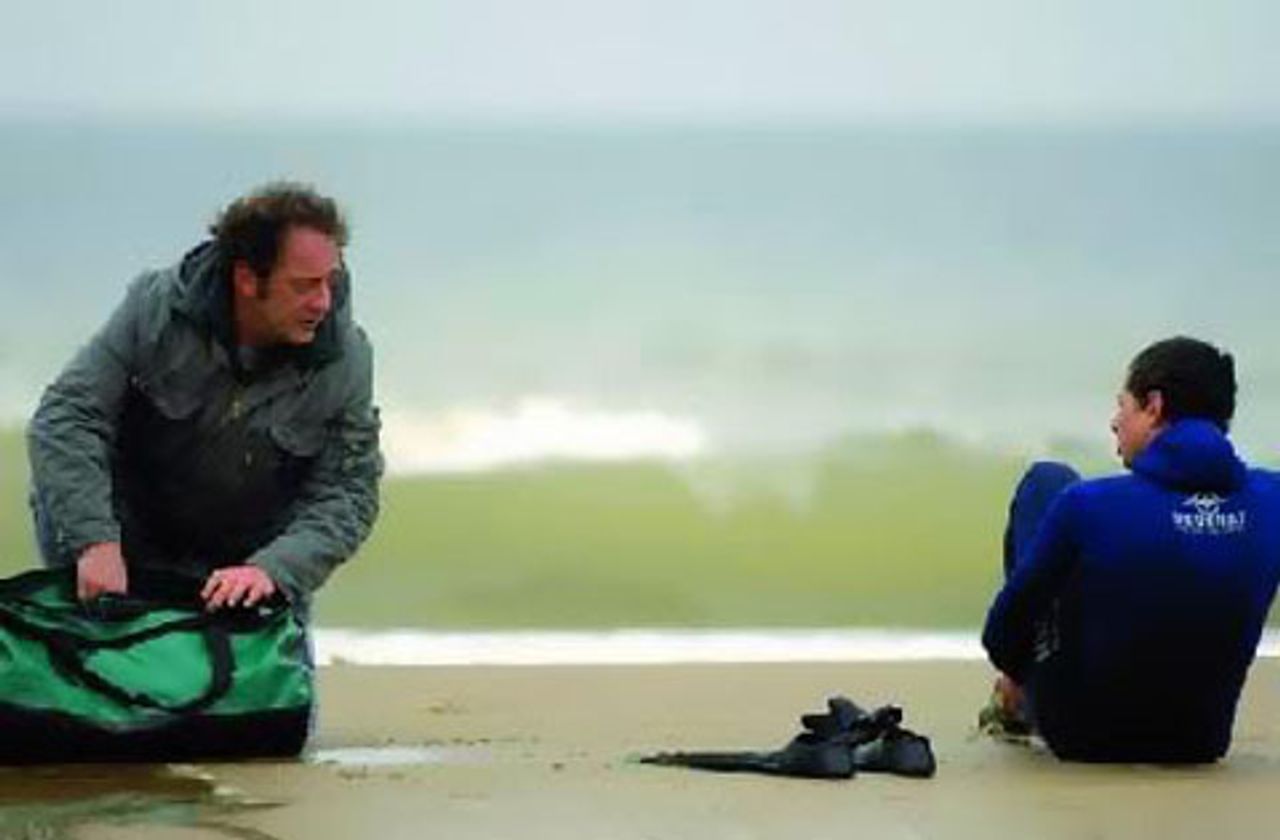Directed by Philippe Lioret; with script by Lioret, Emmanuel Courcol and Olivier Adam
Welcome, the ironically titled latest feature by French director Philippe Lioret, is an intelligent antidote to the ongoing drum-beat of government and media dehumanisation of undocumented immigrants in France and internationally.
Lioret’s movie, which is in French, English and Arabic and set in Calais, is drawn from real events. It centres on a developing friendship between Bilal Kayani (Firat Ayverdi), a poverty stricken 17-year-old Iraqi-Kurd refugee, and the middle-aged Simon Calmat (Vincent Lindon), a Calais swimming instructor.
Bilal is trying to join his girlfriend Mina (Derya Ayverdi) and her family in London, and, like thousands of other teenagers, dreams of playing football for Manchester United. Simon is being divorced by his schoolteacher wife Marion (Audrey Dana), who helps run an illegal soup kitchen for the hundreds of so-called illegal immigrants trying to find a way to cross the Channel to England.
Night shots of the Calais trucking depots and semi-militarised approaches to the Channel tunnel are chilling, as are the measures introduced by cross-Channel trucking companies, such as the use of sniffer dogs, heartbeat and carbon dioxide detectors and other techniques, to locate any stowaways.
Early portions of the movie show Bilal and five other refugees being smuggled onto an English-bound lorry. The young men have paid a “fixer” €500 to get them into the back of the truck and have placed plastic bags over their heads to circumvent the carbon dioxide detectors. But they are quickly discovered and taken into custody by French authorities after Bilal becomes terrified and pulls the bag off his head. Bilal panicked because he had previously been traumatised by the military in Turkey who captured and kept him “hooded” for eight days.
 Simon (Vincent Lindon) and Bilal (Firat Ayverdi)
Simon (Vincent Lindon) and Bilal (Firat Ayverdi)Bilal is brought before a Calais court. Although not imprisoned, because his is not legally considered an adult and is from an officially designated “unsafe country”, he is turned out on the streets with no shelter or assistance. Like other “clandestines”, Bilal ends up in “the jungle”, a collection of makeshift shelters for hundreds of refugees, half of them juveniles and mainly from Iraq, Afghanistan, Pakistan and Africa.
Bilal, however, is determined to reach London and, after seeing the white cliffs of Dover shimmering in the distance, decides that he will try and swim the Channel. Bilal is a talented footballer but is barely able to swim and uses his last remaining cash for a few swimming lessons from Simon. The rather gruff swimming instructor, having been previously indifferent to the situation facing refugees—a point of tension between him and his wife—is suspicious of Bilal. He decides, however, to assist the young Iraqi-Kurd, hoping that this might win back his wife’s affections, or at least prove to her that he is capable of “helping people”.
Simon soon realises the actual purpose of Bilal’s swimming lessons, and as he begins to understand what is animating the teenager, a deeper bond develops between them. Simon tries to dissuade the 17-year-old from undertaking the perilous 30-kilometre swim across the Channel, one of the busiest sea-lanes in the world, but to no avail.
Welcome does not offer detailed information about Bilal’s former life in Iraq and the desperate situation in that country, or his early relationship with Mina, but it does give a real sense of the brutalising and repressive nature of all border control measures. The key element in Lioret’s movie, however, is its exposure of how French law prosecutes ordinary people who attempt to assist destitute young refugees.
Simon’s decision to assist Bilal, in fact, brings him up against Article L622-1 of the French penal code that makes it a criminal offence to help the undocumented immigrants. Under this legislation anyone found guilty of providing “assistance to the entry, travel or undocumented stay” of a foreigner can be fined €30,000 and jailed for up to five years. Annual quotas are set by the French government, moreover, for L622-1 arrests—5,000 in 2009—to try and intimidate local residents.
A day after Simon brings Bilal and his friend Zoran to his apartment for pizza, the swimming instructor is called in for questioning by the police. Simon is later arrested and charged with aiding a migrant, and then people-trafficking for assisting Bilal in his attempt to swim to England.
Lioret’s film is not ground-breaking cinema, but it’s a sincere and compassionate work. More than one million people saw the movie in the first two months of its release last year in France, an important indication that ordinary people refuse to be sucked in by government and media attacks on refugees.
Firat Ayverdi, who had no previous acting experience, puts in a credible performance as Bilal. Lindon is particularly good as Simon, whose transformation, as he is drawn into Bilal’s struggle and emotionally changed by their friendship, is both nuanced and convincing.
Welcome, which has just been released in Australia, is an important contribution to a subject that has been effectively dramatised by numerous filmmakers during the past two decades. Journey of Hope (1990), directed by Xavier Fuller, and Ghosts (2006) by Nick Broomfield are particularly memorable.
Unfortunately, only a handful of movies have been made produced by Australian filmmakers on this issue. Given that Australian governments—conservative and Labor alike—have systematically demonised refugees and introduced increasingly repressive anti-asylum seeker legislation, this is an inexcusable omission. Local critics have expressed their concern over France’s L622-1 laws. None have mentioned that similar laws were introduced by the Rudd Labor government early this year.
The author also recommends:
An interview with Philippe Lioret, director of Welcome
[17 April 2010]
Australia: Rudd government steps up anti-refugee measures
[20 March 2010]
